Una Dugdale
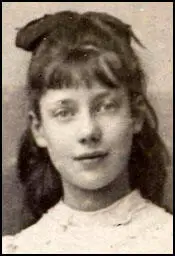
Una Harriet Dugdale, the elder daughter and one of five children of Commander Edward Stratford Dugdale and his wife, Alice Florence Richards Dugdale, was born on 28th January 1879. Her parents' household had five servants. Una was educated at Sacré Coeur Convent in Paris and Cheltenham Ladies' College. (1) In her youth she was a talented skater and an "excellent amateur actress". (2)
On 21st June, 1907, Una Dugdale became involved in the campaign for women's suffrage after hearing Christabel Pankhurst speaking at Hyde Park. Dugdale watched as "Christabel roared and gestured like a woman possessed, denouncing injustices perpetrated against women and children by an uncaring patriarchy." (3)
As a result of this meeting Una Dugdale joined the Women Social & Political Union (WSPU) and persuaded her father to join the Men's League For Women's Suffrage. Dugdale also toured the country with Emmeline Pankhurst helping her to recruit more women to the cause. (4)
WSPU Campaigner
Una Dugdale developed a reputation as an outstanding orator. According to The Sketch: "Women's Suffrage has many fervent supporters among Society women, and is a most accomplished recruit has been added to the cause in the person of Miss Una Dugdale who is one of the most eloquent speakers the 'Votes for Women' party now possess. Miss Dugdale... has given up almost the whole of her spare time to political propaganda." (5)
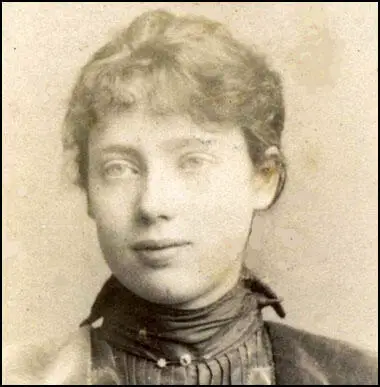
Dugdale began working with Helen Fraser in Aberdeen, where she addressed the fishermen in Stonehaven. In May 1908 Dugdale campaigned for Joseph Burgess, the Independent Labour Party candidate, against Robert Harcourt, the Liberal Party candidate in the Montrose Burghs by-election. Fraser later recalled: "The decrease in the Liberal poll was very considerable, and, despite success, should make them see the electors are not satisfied with them… One significant feature on the polling day in Montrose was the active hostility displaced towards us by the official Liberals." (6)
Una Dugdale and Helen Fraser also took part in the Newcastle-upon-Tyne by-election, on 25th September, 1908. Upset by the failure of the Liberal government to introduce women's suffrage the Women Social & Political Union supported Edward Hartley, a member of the Social Democratic Federation. (7)
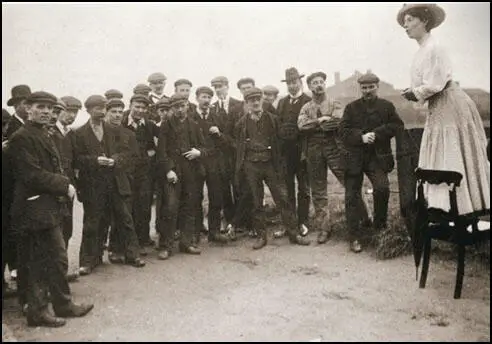
Dugdale took part in a demonstration that included Emmeline Pethick-Lawrence, Ada Flatman, Marion Wallace-Dunlop, and Ada Wright, outside the House of Commons on 13th October, 1908. Dugdale later recalled that she "somehow managed to evade a policeman and ran to the door of Westminster Hall but alas! two plain clothes police caught me and dragged me like a sack of potatoes and flung me outside the gates again. One of them bent down and struck my head and face with both fists." (8)
In 1909 Una Dugdale converted Princess Sophia Duleep Singh to the cause of women's suffrage. Sophia joined the Richmond and Kew branch of the WSPU whereas her sister, Catherine Duleep Singh, became an active member of the Esher and Molesey branch. (9) Sophia Duleep Singh later played an important role in the Women's Tax Resistance League. The courts warned the women that if they refused to pay, they risked the enforced seizure and sale of their property and the worst offenders would be sent to prison. (10)
Later that year Una Dugdale was arrested along with Lady Constance Lytton and twenty-four other women while demonstrating outside the House of Commons. On their release "they were accorded an enthusiastic reception by members of the Women's Social and Political Union, and, headed by a band and followed by a number of sympathisers, proceeded in carriages to the Inns of Court Hotel, Holborn, where a special breakfast welcome had been arranged." (11)
At a Women Social & Political Union meeting held at Rockstone House, Pinner, Dugdale explained how she "suffered serious violence in a police charge". She then went on to defend the militant tactics of the WSPU. The Uxbridge Gazette reported: "The militant tactics had not put back the movement, but on the contrary had put more life and new blood into it. She falsified the statements that the methods of the suffragettes in the past were unwomanly, and said that self-presentation applied to women as well as men. Women's honour and their birth right was at present behind locked doors, and it behoved them to force the doors down. They had to walk side of the whole of their sex, not only of these islands, but all over the world." (12)
Conciliation Bill
In January 1910, H. H. Asquith called a general election in order to obtain a new mandate. However, the Liberals lost votes and was forced to rely on the support of the 42 Labour Party MPs to govern. Henry Brailsford, a member of the Men's League For Women's Suffrage wrote to Millicent Fawcett, the leader of the National Union of Woman's Suffrage Societies (NUWSS), suggesting that he should attempt to establish a Conciliation Committee for Women's Suffrage. "My idea is that it should undertake the necessary diplomatic work of promoting an early settlement". (13)
Emmeline Pankhurst, the leader of the WSPU agreed to the idea and they declared a truce in which all militant activities would cease until the fate of the Conciliation Bill was clear. A Conciliation Committee, composed of 36 MPs (25 Liberals, 17 Conservatives, 6 Labour and 6 Irish Nationalists) all in favour of some sort of women's enfranchisement, was formed and drafted a Bill which would have enfranchised only a million women but which would, they hoped, gain the support of all but the most dedicated anti-suffragists. (14) Fawcett wrote that "personally many suffragists would prefer a less restricted measure, but the immense importance and gain to our movement is getting the most effective of all the existing franchises thrown upon to woman cannot be exaggerated." (15)
The Conciliation Bill was designed to conciliate the suffragist movement by giving a limited number of women the vote, according to their property holdings and marital status. After a two-day debate in July 1910, the Conciliation Bill was carried by 109 votes and it was agreed to send it away to be amended by a House of Commons committee. However, when Keir Hardie, the leader of the Labour Party, requested two hours to discuss the Conciliation Bill, H. H. Asquith gave the impression he might drop the measure. (16)
The following month Una Dugdale accompanied Emmeline Pankhurst on a tour of Scotland in order to gain support for the WSPU who were attempting to persuade the government to give enough time to allow the Conciliation Bill to pass into law. The local newspaper reported: "Mrs Pankhurst criticised the action of prominent members of the Cabinet in dealing with the Conciliation Bill. The bill was still very much alive." (17)
However, it was not long before Emmeline Pankhurst came to the conclusion that Asquith had betrayed her and on 18th November, 1910, arranged to lead 300 women from a pre-arranged meeting at the Caxton Hall to the House of Commons. Pankhurst and a small group of WSPU members, were allowed into the building but Asquith refused to see them. Women, in "detachments of twelve" marched forward but were attacked by the police. (18)
Sylvia Pankhurst later described what happened on what became known as Black Friday: "As, one after the other, small deputations of twelve women appeared in sight they were set upon by the police and hurled aside. Mrs Cobden Sanderson, who had been in the first deputation, was rudely seized and pressed against the wall by the police, who held her there by both arms for a considerable time, sneering and jeering at her meanwhile.... Just as this had been done, I saw Miss Ada Wright close to the entrance. Several police seized her, lifted her from the ground and flung her back into the crowd. A moment afterwards she appeared again, and I saw her running as fast as she could towards the House of Commons. A policeman struck her with all his force and she fell to the ground. For a moment there was a group of struggling men round the place where she lay, then she rose up, only to be flung down again immediately. Then a tall, grey-headed man with a silk hat was seen fighting to protect her; but three or four police seized hold of him and bundled him away. Then again, I saw Miss Ada Wright's tall, grey-clad figure, but over and over again she was flung to the ground, how often I cannot say. It was a painful and degrading sight. At last, she was lying against the wall of the House of Lords, close to the Strangers' Entrance, and a number of women, with pale and distressed faces were kneeling down round her. She was in a state of collapse." (19)
Several women reported that the police dragged women down the side streets. "We knew this always meant greater ill-usage.... The police snatched the flags, tore them to shreds, and smashed the sticks, struck the women with fists and knees, knocked them down, some even kicked them, then dragged them up, carried them a few paces and flung them into the crowd of sightseers." (20)
The photograph of Ada Wright on the front page of The Daily Mirror the next day caused a great deal of embarrassment to the Home Office and the government demanded that the negative be destroyed. (21) Wright told a reporter that she had been at seven suffragette demonstrations, but had "never known the police so violent." (22) Charles Mansell-Moullin, who had helped treat the wounded claimed that the police had used "organised bands of well-dressed roughs who charged backwards and forwards through the deputations like a football team without any attempt being made to stop them by the police." (23)
Marriage to Victor Duvall
In 1911 Una Dugdale met her future husband Victor Duval. Duval was a strong supporter of women's suffrage. (24) His sister, Elsie Duval, had been a member of the Women's Freedom League and the Women Social & Political Union. Victor Duval was also the founder of Men's Political Union for Women's Enfranchisement. "The society was formed as a result of a growing conviction among men, as well as women, that the delay in removal of the sex disqualification from the Parliamentary franchise was due to the determined indifference of the Government rather than to any considerable opposition in the country." (25)
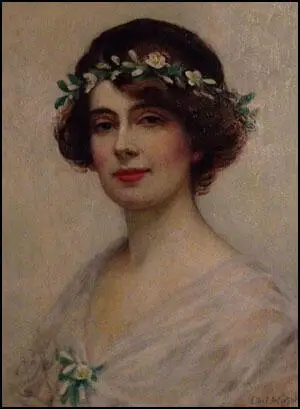
The couple married on 13th January 1912. It was announced that the word "obey" would be omitted from the marriage service at the Savoy Chapel. However, the Archbishop of Canterbury, sent his representative to tell the Rev. Hugh Chapman, that the omission would make the validity of the marriage doubtful. "The couple acquiesced, and the usual marriage ceremony was proceeded with." (26)
Margaret Nevinson later pointed out in The Vote, the newspaper of the Women's Freedom League, that the wedding had "the unique experience of a ceremony where bride and bridegroom, bridegroom's mother, most of the bridesmaids, and many of the guests had all suffered terms of imprisonment." (27)
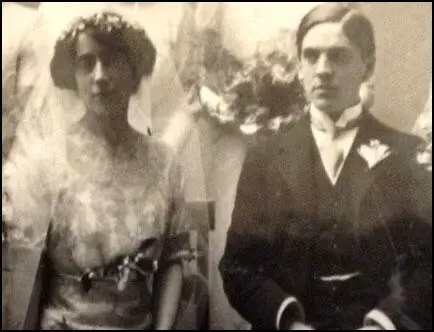
In the Pall Mall Gazette, the vicar who officiated at her wedding, Hugh Chapman, argued that there should be a discussion on the wording of the wedding service. "The intention of a true marriage is that the service entered on should be altogether mutual and equal, each glorying in a deference which crowns the other without the smallest lowering of themselves. It would most assuredly be a good work and is clear case for a referendum to the clergy, if their opinions on the whole subject were canvassed throughout." (28)
It was reported in the Aberdeen Press and Journal that the story had begun a national debate on the subject. Millicent Leveson-Gower, Duchess of Sutherland, stated that "obey" an unnecessary word. "Love and honour" stand much stronger without it. Jennie Spencer-Churchill, the wife of George Cornwallis-West said that although the "husband should be recognised as the head of the house between two people who are admittedly to the companions, the word is grotesque." The newspaper quoted Lena Ashwell and Beatrice Harraden as saying they would have the word "obey" left out of the wedding service. (29)
As Catherine Blackford pointed out: "Marriage reform had long been a feminist concern and Duval's standpoint signified a feminist commitment to marriage as an equal partnership based on love and respect rather than subservience and subordination." (30) Later that year she explained her reasons for departing from convention in her pamphlet Love and Honour but not Obey. (31)
Later Life
During the First World War Victor Duval served with the Royal Engineers at Salonika. (32) After the war Una Duval appears to have devoted herself to family life, in particular bringing up her two daughters; but she did not encourage them to take up careers. (33) Una Duval remained committed to preserving the memory of the militant suffrage struggle and in 1926 along with Edith How-Martyn she formed the Suffragette Fellowship to "perpetuate the memory of the pioneers and outstanding events connected with women's emancipation and especially with the militant suffrage campaign, 1905-14, and thus keep alive the suffragette spirit". (34)
Victor Duval stood unsuccessfuly for the Liberal Party at South Nottingham (December, 1923) and North Camberwell (October 1924). Una Dugdale Duval used to sing at his political meetings. The Westminster Gazette reported: The Liberal candidate for North Camberwell (Mr Victor Duval) was continually interrupted with parrot cries at a meeting at Old Kent Road Baths on Saturday night. Finally he announced that his wife would sing, but as soon as she started the rowdies yelled and whistled and then screeched "The Red Flag". "Now I know what you are," said the candidate. (35)
In the 1929 General Election Duval was the Liberal Party candidate in South-West Norfolk on the recommendation of Herbert Samuel. At an election meeting in April he criticised the Conservative government led by Stanley Baldwin: "Turning to politics generally, he said they were constantly being told that the taxpayers could look for no relief, and it would appear that was the opinion of the government. Every year new taxes were put on, but there appeared to be no thought of taking taxes off, and although in the Budget there were some measures of relief for agriculture and for the income-tax payer in regard to children, yet the main result of that Budget was that certain burdens were removed from the shoulders of one section. The duty of a Government should be to legislate for all people without respect to any particular to any particular class or section… Mr Duval went on to declare himself a Free Trader, and concluded by declaring his faith in capitalism and private enterprise, and protesting against the Socialist preaching of class warfare." (36)
After finishing a poor third to the Labour Party candidate, William Taylor, in the General Election he changed his mind about socialism and joined the Labour Party: "I have come to the conclusion after careful consideration that it is today through the Labour Party that the active advance towards a brighter and better life for the people for which I have so long fought can best be realised." (37)
Victor Diederichs Duval died on 4th October 1945. Una Dugdale Duval, lived another 30 years and died aged 96 in St Stephen's Hospital, Chelsea, London, on 24 February 1975. (38)
Primary Sources
(1) The Sketch (4th March 1908)
Women's Suffrage has many fervent supporters among Society women, and is a most accomplished recruit has been added to the cause in the person of Miss Una Dugdale who is one of the most eloquent speakers the "Votes for Women" party now possess. Miss Dugdale like her sister, Mrs Harrison-Broadley, is also noted in the skating world, and she is an excellent amateur actress, but of late she has given up almost the whole of her spare time to political propaganda.
(2) Helen Fraser, The Women's Franchise (21st May 1908)
Our closing meetings in Montrose Burghs were varied in character, some orderly and enthusiastic, others rowdy and difficult to deal with – the Dundee excitement having an unsettling effect.
The decrease in the Liberal poll was very considerable, and, despite success, should make them see the electors are not satisfied with them… One significant feature on the polling day in Montrose was the active hostility displaced towards us by the official Liberals. One regrets that in politics the personal element and grievance should be allowed to to come in at all. Every reasonable Liberal knows ours is a political policy, and while we wage war on the Government as the Government, there is no reason why it should descend to this level of personal retaliation.
On Tuesday evening Miss Una Dugdale and I went to St Andrews for a meeting in the Public Hall there, Miss MacGregor acting as a chairman. We had some students who wanted amusement and had "the inevitable bell", but we had splendid attention and an excellent meeting.
(3) The Manchester Courier (26nd March 1909)
Twenty-six suffragettes were released from Holloway Gaol on Wednesday morning. They were sentenced at Bow Street Court in default of finding sureties in connection with the disturbances in Parliament Square. Among them were Lady Constance Lytton, sister of the Earl of Lytton, and Lady Betty Balfour; Miss Daisy B. Solomon, Crown Minister of the Cape, and known as the Gladstone of South Africa; Mrs Frank Corbett, whose father was in the Indian Civil Service; Miss Una Dugdale, eldest daughter of the Commodore E. S. Dugdale R.N. and cousin of the Hon W.R. Peel MP…. They were accorded an enthusiastic reception by members of the Women's Social and Political Union, and, headed by a band and followed by a number of sympathisers, proceeded in carriages to the Inns of Court Hotel, Holborn, where a special breakfast welcome had been arranged.
(4) The Uxbridge Gazette (9th April, 1910)
A well-attended and very successful meeting, under the auspices of the National Women's Social and Political Union, was held at Rockstone House, Payne's Lane, Pinner, on Wednesday afternoon, by kind invitation of Mr and Mrs Terrero. The chair was occupied by Mr Terrero.
The Chairman cordially welcomed all present. They were especially fortunate in having with them two of the best speakers connected with the movement. Mrs Eastes and Miss Una Dugdale, both of whom had suffered imprisonment and martyrdom in the cause, which, whether they agreed with that or not, at least spoke for their sincerity. Miss Dugdale had even suffered serious violence in a police charge. Neither of these ladies looked very formidable, or of the rowdy or hooligan type – and he really thought he should not feel very frightened, although he did not pose as a great hero…
Miss Una Dugdale declared that the militant tactics had not put back the movement, but on the contrary had put more life and new blood into it. She falsified the statements that the methods of the suffragettes in the past were unwomanly, and said that self-presentation applied to women as well as men. Women's honour and their birth right was at present behind locked doors, and it behoved them to force the doors down. They had to walk side of the whole of their sex, not only of these islands, but all over the world.
(5) Aberdeen Press and Journal (10th September 1910)
Last night Mrs Pankhurst, the leader of the militant suffragists, addressed a meeting in the Music Hall, Inverness. The chair was occupied by Miss Dugdale, and there was a fair attendance.
Mrs Pankhurst criticised the action of prominent members of the Cabinet in dealing with the Conciliation Bill. The bill was still very much alive.
Mrs Pankhurst spoke at Elgin on Thursday evenings. She was accompanied on the platform by Miss Una Dugdale.
(6) Aberdeen Press and Journal (3rd August 1911)
Mrs Pankhurst, accompanied by Miss Una Dugdale, is making a tour of the Highlands in August and September, and will speak at Blairgowrie, Pitlochry, Kinguessie, Grantown, Forres, Fraserburgh, Peterhead, and Ballater…. Mrs Pankhurst will speak on "The Conciliation Bill."
(x) Aberdeen Press and Journal (17th January 1912)
In addition to the list published in the journal yesterday, further opinions have been by well known women as to whether the word "obey" should be omitted from the marriage service.
The Duchess of Sutherland thinks "obey" an unnecessary word. "Love and honour" stand much stronger without it.
Mrs George Cornwallis-West says that, although the husband should be recognised as the head of the house between two people who are admittedly to the companions, the word is grotesque…
Lady Alexander thinks the word is hopelessly old-fashioned and out of date.
Miss Lena Ashwell and Miss Beatrice Harraden would have the word left out, and Madame Marchesi says that "In these days the obedience of a wife to a husband is an anachronism."
Miss Evelyn Milliard thinks its deletion would not make any difference, whilw Miss Helen Mathers says "Either leave ‘obey' in or don't get married at all. We want English, not American wives."
(7) The Overland China Mail (20th January 1912)
It was announced that the word "obey" would be omitted from the marriage service at the wedding of Miss Una Dugdale, niece of Viscount Peel, and Mr Victor Duval (both of whom are prominent suffragists) at the Chapel Royal yesterday. The Chaplain announced, however, that he had taken advice and was informed that the omission would make the validity of the marriage doubtful. The couple acquiesced, and the usual marriage ceremony was proceeded with.
(8) John Bull Magazine (27th January 1912)
Lovely woman is asserting herself with the suffrage. One of the most recent examples of revolt from thralldom to the tyrant Man and his statutes is Miss Una Dugdale, who, on the occasion of her recent wedding, objected to "obey" young Mr. Victor Duval – and ultimately covenanted to do so only under protest. We have been privileged to see a photo of the happy couple, and we are quite sure that the lady meant what she said – or, rather, did not mean what she was forced to say.
(9) Suffrage Annual and Women's Who's Who (1913)
The daughter of Commander Edward Stratford Dugdale, R.N., and Mrs. Dugdale; educated at the Sacré
Coeur Convent, Paris, and Cheltenham Ladies’ College; joined W.S.P.U. in 1907 and assisted actively in the propaganda work of the Union, especially by speaking at by-elections; arrested in November, 1910, and appeared at Bow Street before Sir Albert de Rutzen on a charge of window-breaking ; sentenced to 40/- fine or 14 days’ imprisonment; served sentence in Holloway Gaol; Organising Secretary to Actresses’ Franchise League from December, 1910, to August, 1911. Publications: Short stories in various periodicals. Recreations: Golf, riding and
motor driving. Club: Suffrage, 3, York Street, St. James’s, 8.W.

